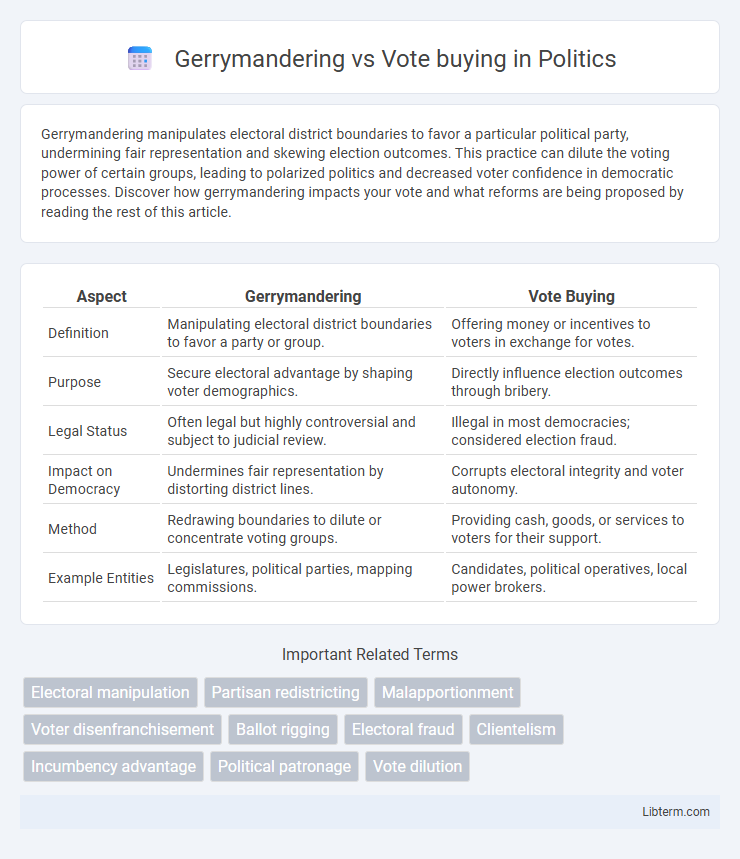Gerrymandering manipulates electoral district boundaries to favor a particular political party, undermining fair representation and skewing election outcomes. This practice can dilute the voting power of certain groups, leading to polarized politics and decreased voter confidence in democratic processes. Discover how gerrymandering impacts your vote and what reforms are being proposed by reading the rest of this article.
Table of Comparison
| Aspect | Gerrymandering | Vote Buying |
|---|---|---|
| Definition | Manipulating electoral district boundaries to favor a party or group. | Offering money or incentives to voters in exchange for votes. |
| Purpose | Secure electoral advantage by shaping voter demographics. | Directly influence election outcomes through bribery. |
| Legal Status | Often legal but highly controversial and subject to judicial review. | Illegal in most democracies; considered election fraud. |
| Impact on Democracy | Undermines fair representation by distorting district lines. | Corrupts electoral integrity and voter autonomy. |
| Method | Redrawing boundaries to dilute or concentrate voting groups. | Providing cash, goods, or services to voters for their support. |
| Example Entities | Legislatures, political parties, mapping commissions. | Candidates, political operatives, local power brokers. |
Introduction to Gerrymandering and Vote Buying
Gerrymandering manipulates electoral district boundaries to favor a political party, undermining fair representation and skewing election outcomes. Vote buying involves illegal transactions where candidates provide money or goods to voters in exchange for their support, compromising electoral integrity. Both practices distort democratic processes, eroding public trust and weakening the principle of equal voting power.
Historical Origins and Evolution
Gerrymandering originated in the early 19th century United States, named after Governor Elbridge Gerry's 1812 redistricting plan designed to benefit his party by manipulating electoral boundaries. Vote buying, with roots in ancient democratic practices, evolved as a corrupt method where candidates offered money or goods in exchange for votes, undermining electoral integrity. Both practices have developed over centuries, adapting to legal reforms and technological changes while posing ongoing challenges to fair representation.
Mechanisms of Gerrymandering
Gerrymandering manipulates electoral district boundaries to create an unfair advantage for a political party by concentrating or dispersing voters based on demographic data and voting patterns. Techniques such as "cracking" dilute opposing voters across many districts, while "packing" concentrates them into a few to minimize their influence, often relying on advanced GIS mapping tools. This structural manipulation contrasts with vote buying, which directly influences individual voter behavior through incentives or bribes.
Common Methods of Vote Buying
Common methods of vote buying include direct cash payments, distribution of goods such as food or clothing, and offering services like transportation to polling stations. Candidates or parties may also promise employment opportunities or manipulate social benefits to secure voter loyalty. These tactics undermine electoral fairness by exploiting voters' immediate needs and perpetuating systemic corruption.
Legal Frameworks and Enforcement
Gerrymandering is regulated through constitutional provisions and judicial rulings that prohibit racial or partisan manipulation of electoral district boundaries, while enforcement depends on courts striking down unfair maps. Vote buying is criminalized under election laws that impose penalties for bribery and corruption, with enforcement conducted by election commissions and law enforcement agencies. Both practices undermine democratic integrity, but gerrymandering cases often hinge on legal challenges in courts, whereas vote buying cases require direct evidence and proactive investigations.
Impact on Electoral Outcomes
Gerrymandering manipulates electoral boundaries to create an unfair advantage for a political party, often resulting in distorted representation that skews election outcomes. Vote buying directly influences voter behavior through financial incentives or gifts, undermining the integrity of the democratic process and potentially swaying close races. Both practices erode public trust and compromise the legitimacy of electoral results by prioritizing manipulation over genuine voter preference.
Societal and Ethical Implications
Gerrymandering undermines democratic principles by manipulating electoral district boundaries to dilute voter representation, leading to political inequality and diminished public trust in governance. Vote buying corrupts the electoral process by exchanging money or favors for votes, eroding the integrity of elections and perpetuating social inequality through the exploitation of economically vulnerable populations. Both practices compromise the ethical foundation of democracy, fostering disenfranchisement and weakening societal cohesion.
Case Studies: Global Perspectives
Gerrymandering manipulates electoral district boundaries to favor specific parties, as seen in the United States' 2010 redistricting that skewed congressional representation. Vote buying, prevalent in countries like India and Nigeria, involves offering material incentives to influence voter behavior, undermining electoral integrity. Both practices distort democratic processes but operate through structural manipulation and direct voter coercion, respectively, highlighting the challenges of ensuring free and fair elections globally.
Strategies for Prevention and Reform
Effective strategies for preventing gerrymandering include the establishment of independent redistricting commissions and the use of algorithmic mapping tools to create fair electoral boundaries based on demographic data. Combating vote buying involves strengthening voter education programs, implementing strict legal penalties, and increasing transparency during campaign financing and electoral processes. Both reforms require robust oversight by electoral commissions and active involvement of civil society organizations to ensure accountability and protect the integrity of democratic elections.
The Future of Fair Elections
Gerrymandering manipulates electoral district boundaries to favor specific parties, while vote buying directly corrupts voter behavior through financial incentives, both severely undermining democratic integrity. Emerging technologies like blockchain-based voting systems and independent redistricting commissions offer promising solutions to enhance transparency and fairness in elections. Strengthening legal frameworks and increasing public awareness remain critical to combating these practices and securing the future of fair elections globally.
Gerrymandering Infographic

 libterm.com
libterm.com